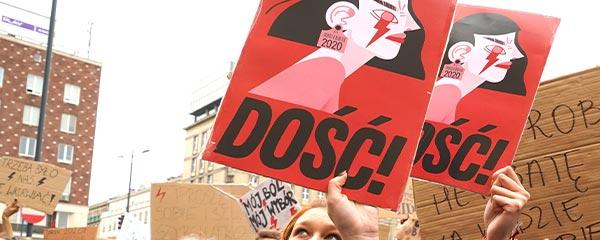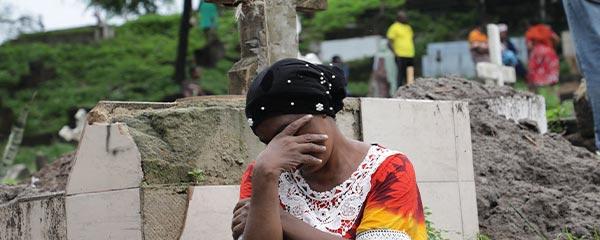A conversation with Johanna Godoy
║┌┴¤═°'s Regional Director for the World Poll in Latin America and the Caribbean
During times of crisis, like a pandemic, challenges that existed before the crisis are only amplified. Is this true for women and girls in your region? Tell me about how women's lives were affected.
Godoy: Unfortunately, the pandemic has worsened the already challenging situations that many women in Latin America find themselves in.
Women's lives have been affected in different areas, but the three that stand out to me are the increased violence we are seeing toward women and girls, their higher levels of unemployment and lower earnings, and the burnout they are feeling and mental health issues that go with that.
Let's talk about violence toward women and girls first. This is not a new problem in Latin America. Before the pandemic, the region already had some of the highest levels of femicide and domestic violence in the world. The pandemic only heightened the frequency of abuse, because women were forced to share the same space with their aggressors for long periods.
During the pandemic, the United Nations has reported an increase in calls to Violence Against Women (VAGW) helplines. For example, in Argentina, at the start of the pandemic, the number of calls increased by 39%, while in Mexico, they increased by 53%. Another example is Brazil, where the cases of femicides increased by 22% between March and April 2020.
Switching quickly to women's incomes and jobs, although the pandemic has had a general financial impact on the region, it has been worse for women. Many women in the region had to temporarily quit their jobs and dedicate their time to activities at home, childcare, remote schooling and care for members of the family, among others. This made it even more difficult for them to achieve financial independence.
In 2020, the World Poll found that 46% of women in Latin America said they did not have enough money at times to provide food for their family, while 35% of men said the same.
Lastly, the consequences of the pandemic, such as quarantine and mobility restrictions, remote school and work activities, and increased violence against women, have all negatively affected the day-to-day lives of Latin American women.
This is reflected in worse wellbeing and mental health during these challenging times. More than 50% of women in Latin America reported having experienced stress "yesterday" in 2020, while 44% of men reported having felt that way.
One of these challenges, we know, might be whether people think women are treated with respect. It was the lowest in the world in your region before the pandemic. What's the climate like now?
Godoy: Latin America continues to be the region with the lowest levels of perceived respect for women. In 2021, a median of 63% worldwide reported that women were treated with respect, while in Latin America only 30% thought this way. Eight of the 10 countries with the lowest perceptions of respect for women are in Latin America, with Jamaica, Brazil, Peru, Colombia and Honduras ranking the lowest.
This perception will not improve significantly when the pandemic is over; it requires actions aimed at awareness campaigns, implementation of public policies and modification of the judicial system.
What's the one biggest challenge for women in your region as we enter our third year of the pandemic?
Godoy: It is very difficult to identify one main challenge when women in Latin America face multiple adversities. But now that we are entering a third year of pandemic, a priority is to reinsert women into economic activities and education, generating opportunities in which work and family goals can be achieved and household income increased at the same time. The aim needs to be economic independence, resulting in a greater feeling of security to face, and overcome, situations of violence, mistreatment and inequality.
Tell me about some of the positive changes you are seeing for women -- if you are seeing any. What gives you hope?
Godoy: Despite the important challenges that women in Latin America continue to face, there are improvements that give me hope that we are making strides toward more gender equality in the region. An example of this is the leading role that women are taking in the Chilean government. For the first time in a Latin American country, the composition of the cabinet is predominantly female (14 women of the total of 24 officials). Women have taken positions that historically had been assigned to men, like the secretary of the interior. Changes like this recognize and dignify the role of women.
In terms of the gender-based violence, there are important initiatives that have had an impact on raising awareness of this serious problem. In Brazil, for example, because of the difficulty in reporting domestic aggression, there is a campaign that focuses on different, creative ways of reporting it so people can get help. Actions like putting a red X with lipstick on the palm of a woman's hand or adding a panic button on an online app have been promoted as ways to alert people so they can support the victim.
In some cases, remote working has opened opportunities for women to reinvent themselves and generate income while at home. There has been a proliferation of female entrepreneurs during this challenging time. They are creating businesses in areas such as cooking, jewelry and teaching, which have become valuable opportunities for them to obtain financial independence.
These actions are not enough to make a drastic change in the society, but definitely they are a starting point to position women better in the region and ensure women's roles are respected and recognized.
Lastly, when you look into the future, what part do you see women in your region playing in building a resilient world -- when it eventually recovers from the pandemic?
Godoy: Latin American women have demonstrated their strength during these challenging and difficult times, not only through the multiple responsibilities they have managed to carry out (work and family) but also in the impact they have had in the health sector. In many countries in the region, women have a high presence in this sector.
These have been challenging years, but where women have shown their ability and leadership, it has been an opportunity to recognize their achievements. This is a great example that is being passed on to new generations.
In Chile, there is an organization that focuses on girls' education, giving them tools to achieve their goals. Currently in the region, there are many organizations fighting for gender equity. In some cases, they have been able to implement radical legal and social changes, but the road is still long. The first steps are being taken to build an equality-based region and respect the important role that women have in building a better world.
Read more stories about women around the world on our .




